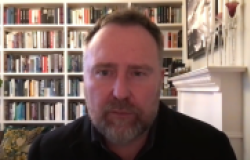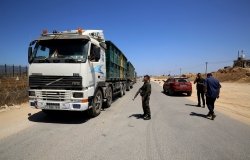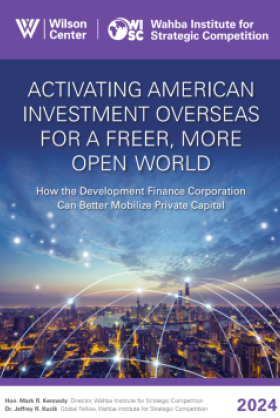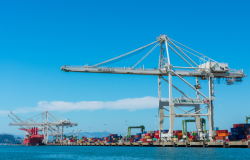Navigating the Post Cold-War, Post 9/11 World: 2007 C. Warren Goldring Annual Lecture on Canada-U.S. Relations
In a lecture on the emerging security challenges facing the United States post-9/11, Richard Haass addressed future public policy decisions and relations between Canada and the United States.
Overview
Richard Haass, president of the Council on Foreign Relations, delivered remarks at the third annual C. Warren Goldring Annual Lecture on Canada-U.S. relations, held on May 1, 2007. Held annually in Toronto, the C. Warren Goldring Lecture series promotes increased understanding of public policy decisions in both Canada and the United States. Haass' lecture, entitled, "Navigating the Post-Cold War, Post 9-11 World," examined the new and emerging security challenges the United States will face in a globalized and interdependent world. Haass began his remarks by outlining three major areas of change in the post-Cold war, post-9/11 security environment:
- The chance of war between great powers is slimmer today than it has been for centuries;
- Even the United States, the world's sole superpower, cannot control the global system unilaterally; and,
- The characteristics of globalization—particularly the rapid flow of people, ideas, and commodities—are forces beyond the control of individual governments.
Haass stated that the security challenges of today's world flowed from threats stemming from globalization, noting that just because the threats are diffuse did not mean they were less threatening. He highlighted terrorism, climate change, pandemic disease, and the spread of nuclear and other dangerous materials as some of the most significant transnational threats facing the world today.
Addressing these threats, maintained Haass, will not only require U.S. leadership, but an unprecedented level of collaboration between nations. Haass said that by definition such global matters require a collective response. This meant that new rules and norms had to be developed based on goals that were broadly acceptable to most countries. Haass cited terrorism as an example: "We need to build unanimous opposition to the intentional killing of innocent people for political purposes. We need to de-legitimize the idea that any cause justifies the intentional killing of innocents."
In addition to transnational threats, Haass also listed Asia and the Middle East as regions that could pose U.S. security challenges in the future. He noted that the Middle East's vast oil reserves would preserve the region's economic importance to the United States for the foreseeable future. Nevertheless, the potential proliferation of conflict, weapons of mass destruction, and terrorism throughout much of the Middle East continues to pose one of the most significant security challenges to the United States, he said.
To address the ongoing security threat posed by the Middle East, the U.S. and Canada should seek to promote modernization and reform across the region. This entails working to strengthen the rule of law, helping to build robust civil societies, modernizing educational systems, promoting open markets, giving girls and women a chance to participate in all areas of Middle Eastern life, and finding ways to support liberal, tolerant voices. Promoting reform, argued Haass, will require efforts beyond military intervention, and must include support to those groups fighting for human rights and democracy in the region: "In order to avoid a clash between civilizations, we [have] to recognize the clash within a civilization."
Haas praised the Canadian effort to rebuild Afghanistan, and stressed that a continued allied presence was critical to ensure that the country would never again serve as a safe haven for terrorists. Haass maintained that building a solid and secure Afghanistan would require greater cooperation from Pakistan, as well as a long-term political and military commitment from the United States, Canada, and Europe.
In contrast to the Middle East, Haass said that the U.S. faced far more positive challenges in Asia. Describing Asia as the most dynamic region in the world, Haass noted that the United States should encourage the region's rapid economic development in a way that promotes peace and increased prosperity. He advocated the need to create regional architecture that could help Asian nations develop positive relations with the rest of the world. Failure to help Asia channel its newfound prosperity in a progressive and sustainable direction, cautioned Haass, risks the potential for a new arms race, renewed great power rivalry, and even conflict.
In his closing remarks, Haass reiterated that the new post-Cold War, post-9/11 world requires countries to come together to pursue goals ranging from frustrating would-be terrorists, to lifting hundreds of millions of people out of poverty through trade, investment, and the provision of aid linked to economic and political reform. In Haass' words, "the remote chance of conflict between and among the great powers frees us up to target our resources on these global challenges." Haass maintained that the United States could not go it alone and needed partners such as Canada to help create the international rules and institutions required to maintain order in the new era and enforce rules against states that violate them.
Haass fielded several questions from the audience. On the subject of Canada-U.S. cooperation on global environmental issues, he said that the United States and Canada were natural partners as a result of shared interests on energy issues, geographical proximity, and the mutual stake of a global arrangement on climate change. He added that that there was not a trade-off between economic well-being and responsible climate change policy, saying that our societies can have both.
Responding to the question of whether American troops should stay in Iraq, Haass said that he would like to reduce the American role in combat operations because he did not think the fighting could be decisive. However, he also expressed concern that the situation in Iraq would worsen if U.S. troops suddenly left. In his view, American troops are being targeted mainly because they are getting caught up in factional fighting.
Asked why Russia was not included on his list of the top challenges facing the United States, Haass replied that he considered Russia more of a spoiler than a principal challenge, in the sense that Russia could make it harder to deal with Iran and North Korea, and make it more difficult to work on issues such as energy and the environment. "The question is whether we could have a relationship where you have selective cooperation with the Russians and when we can't cooperate, at least there is a ceiling on the degree of disagreement and what is done about it," he said.
In response to a question on recent U.S. foreign policy, Haass said that he was critical of the current administration and particularly of the Iraq War, which he said was a huge drain on U.S. resources. In his opinion, the benefits of the war could never be commensurate with its cost. In more general terms, Haass said that today's world is not as organized or predictable as the world of the Cold War and that relationships between countries are more complex as a result: "[A globalized era] opens up the capacity for greater cooperation amongst and between countries that had historically been adversaries and opens up more complicated possibilities for countries that had historically been allies."
Drafted by Stephanie McLuhan, Program Consultant
David Biette, Director, Canada Institute
Hosted By

Canada Institute
The mission of the Wilson Center's Canada Institute is to raise the level of knowledge of Canada in the United States, particularly within the Washington, DC policy community. Research projects, initiatives, podcasts, and publications cover contemporary Canada, US-Canadian relations, North American political economy, and Canada's global role as it intersects with US national interests. Read more
Thank you for your interest in this event. Please send any feedback or questions to our Events staff.










